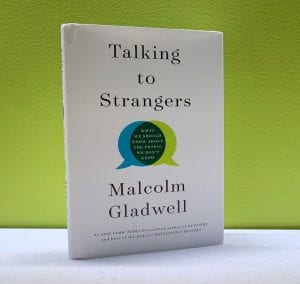Between You and Me: Talking to Strangers Can Be Revealing or Can Be Something Else
By Leah S. Dunaief

A book I recently finished and enjoyed has topped The New York Times Best Sellers Hardcover Nonfiction list, so clearly many others appreciate it as well. It is “Talking to Strangers,” Malcolm Gladwell’s latest offering.
Reading it, in some ways, is like a summary of controversial current events, with a lot of interesting yet extraneous information thrown in because that makes for a good story. And one thing about Gladwell: He is a good storyteller. The author of previous bestsellers including “The Tipping Point,” and “Blink,” Gladwell is said to turn social science into best selling books. One of the critics said that he could probably make a riveting story about a pencil sharpener.
Initially I picked up the book because of its title. I thought it could have been written for me because I habitually and notoriously talk to strangers. I say it that way because I’m not sure the people I am with always appreciate sharing me but I can’t help myself. When I am in a theater and it is intermission, I am interested in how the people around me like the show. When I am at the opera — where a surprising number of different languages are spoken by the audience — I wonder where the people next to me come from and I ask them. Sometimes I even begin chatting with others in an elevator in conversations of obviously limited duration.
Lest you think I am an insensitive pest, I rush to assure you that if those questioned by me would seem unwilling to talk, I would immediately become silent. But I find quite the contrary. Most people seem to enjoy talking to strangers who are sharing the same environment.

So I started reading but was surprised that Gladwell’s theme was quite different from what I was expecting. From his perspective, it is difficult to evaluate a person, especially in a provocative situation, simply by talking with them and reading their body language. Why? Sometimes people lie, and lie convincingly. An example he gives is Bernie Madoff, who with his quiet and thoughtful manner, was able to convince clever and talented financial experts that he was honest. For a time, even members of Renaissance Technologies in Setauket were caught off guard.
As Gladwell wrote, “Through a complicated set of arrangements Renaissance found itself with a stake in a fund run by [Madoff]” and “The people at Renaissance are brilliant … but couldn’t quite make the leap to believe that it was all a setup” despite personal interviews with Madoff. That is, until they became sufficiently suspicious to take out their money, but then only half that was invested with Madoff, according to Gladwell.
There are other examples in the book having to do with cultural or contextual differences between the viewer and the person being viewed, sometimes with disastrous results. One such situation involved Amanda Knox, an American student incarcerated for four years following the murder of her roommate in Perugia, Italy, largely because Italian prosecutors interpreted her youthful American goofiness as signs of guilt. She was subsequently acquitted of the murder.
Another example put forth by Gladwell is the unwillingness of witnesses to recognize the guilt of Jerry Sandusky, the former Penn State assistant college football coach who abused children. Yet another example, the one that starts and ends the book, is of Sandra Bland, the African-American woman from Chicago who was stopped by a white highway patrolman in a small town in Texas for not signaling when she changed lanes. It should have been a routine event. Instead, because of misreading, it turned into a confrontation resulting in her death three days later by hanging in a local jail that was ruled a suicide. There are also fascinating stories about Cuban spies fooling the CIA, among other tales.
Gladwell’s conclusion is that we should “accept the limits of our ability to decipher strangers.” He goes on to say, “What is required of us is restraint and humility. … There are clues to making sense of a stranger. But attending to them requires care and attention.” And knowing that we can be wrong. Anyone who has hired the wrong applicant for a job can vouch for that.







